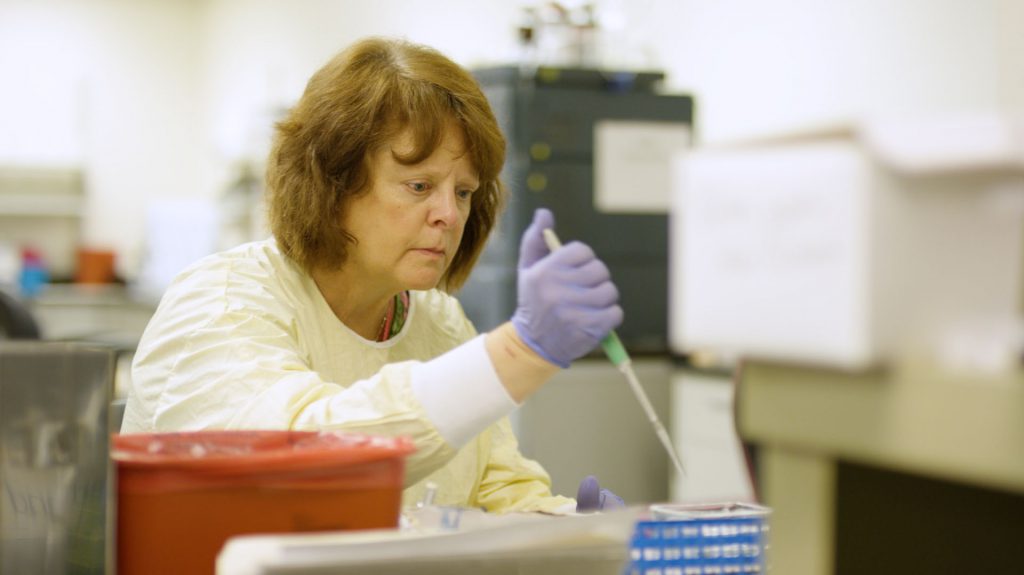Written by Barrett J. Brunsman
St. Elizabeth Healthcare’s hospital in Fort Thomas could be the first in the world to start dosing Covid-19 patients with an experimental drug that might prevent the respiratory illness from causing further lung damage.
CTI Clinical Trial & Consulting of Covington is coordinating the study of the drug PUL-042, which is made by an emerging bio-pharmaceutical firm, Pulmotect Inc. of Houston.
It took less than a month to get FDA clearance to begin the Phase 2 study involving people, which is extraordinarily quick, said Tim Schroeder, CEO and co-founder of CTI.
Edgewood-based St. Elizabeth was the first to have a site green lighted to start screening patients for possible enrollment in the Phase 2 clinical trial, which will involve a total of 100 patients at 10 hospitals around the country. Usually the hospital that opens a trial enrolls more patients than sites that are last.
No other local hospitals will be participating in the Pulmotect study, Schroeder told me.
Dr. Chaitanya Mandapakala, a pulmonologist who is the principal investigator for the Pulmotect clinical trial at St. Elizabeth, is actively looking to treat the first patient. It could be a matter of hours or days for that to happen.
“The drug PUL-042 boosts the innate immunity in the lungs and potentially prevents further lung damage when used early in the Covid-19 disease,” Mandapakala said. “If this clinical trial is successful, it can decrease the hospital stay and improve outcomes without needing to get on a ventilator.”
About half of the patients enrolled in the Pulmotect study will get the experimental drug, which is inhaled. The other half will get a non-active placebo. Three doses of the drug will be administered over seven days, and the study should be complete in 28 days, Schroeder said.
Neither the physicians, nurses, pharmacists nor patients will know who is getting the experimental drug and who is getting the placebo. However, the caregivers might notice an effect in patients within a week or two of PUL-042 being administered, Schroeder said.
If the study goes well, a large Phase 3 clinical trial could be designed this fall. It might take a year or more for PUL-042 to be approved by the FDA, but the drug might receive emergency authorization or could be available to more patients through a larger trial, Schroeder said.
The new clinical trial with patients follows three Phase 1 studies, which indicated that animals given PUL-042 before they were exposed to the virus didn’t develop a coronavirus infection, Schroeder said. And if the animals were given the drug at the same time they were exposed to the virus, they developed a much less severe case of infection.
That’s different than a vaccine, in which antibodies are developed to fight off a virus at a later date, Schroeder said. The period of protection would probably be much shorter for someone administered PUL-042. It remains to be determined whether the drug could be used to protect high-risk health care workers who deal with Covid-19 patients.
Privately held CTI is coordinating more than 15 clinical trials of drugs intended to treat Covid-19, Schroeder said.
“The treatment studies are necessary to save lives and keep people off of ventilators and out of the ICU,” Schroeder said.
“We did launch our first vaccine study last week in Asia,” Schroeder said. “We need to get the vaccine studies going to prevent this in the population as a whole. It’s been crazy busy for us.”
And yet, the outcomes seem to be getting better for Covid-19 patients, Schroeder said.
“As a research organization, every day we talk to dozens of people in the ICU and emergency departments as part of the studies,” Schroeder said. “Two months ago, it was a pretty somber mood. At most of these hospitals, if you got to the stage of being on a ventilator, they were losing as many as 80% of the patients.”
Now, it seems that hospitals have more treatment options, better testing, more ventilators and are staffed appropriately, Schroeder said.
“It’s almost flipped,” he said. “They are preventing many people from getting to the ICU and going on ventilators, and we’re seeing more success for patients who are put on ventilators.
“That’s the one thing you’d like people to know,” Schroeder said. “The sacrifices they’ve made and the investments we’ve made in protective equipment and different studies are paying off.
“We’re still going to have to go a long way,” he said. “In many of these research studies, we’re going to have to get to the end and analyze data and come back and understand exactly how to use these treatments.
“But the environment of the people we deal with every day is becoming increasingly more positive,” Schroeder said. “It’s still a devastating disease, but there is emerging positive news in our ability to diagnose and treat this disorder.”

